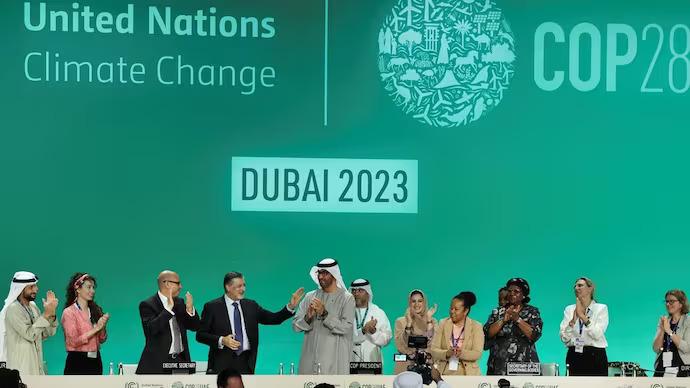COP28 has resounded globally as a historic milestone, signifying a monumental shift in the international consensus towards moving away from fossil fuels. In a momentous occasion, representatives from nearly 200 nations united to commit to reducing global reliance on fossil fuels, signaling the beginning of the end for the age of oil. This groundbreaking agreement, the result of intensive negotiations in Dubai, carries profound implications, highlighting a collective dedication to combating climate change.
Described by COP28 President Sultan al-Jaber as a "historic" accord, the agreement represents a turning point in the global approach to addressing climate change. Al-Jaber emphasized the pivotal nature of implementation, stressing that actions must speak louder than words. This sentiment underscores the urgency and gravity with which nations must approach this agreement.
While the deal has been applauded for making strides in steering away from fossil fuels, it encountered formidable opposition. The push for stronger language advocating the "phase-out" of oil, gas, and coal faced resistance, particularly from major oil-producing nations in the OPEC-led coalition. This opposition led to prolonged negotiations, raising concerns about a potential impasse.
Diverse perspectives and challenges emerged during COP28. Island nations, confronting extreme vulnerability to climate change, ardently advocated for stricter actions to eliminate fossil fuel usage. They found support from major oil and gas producers such as the United States, Canada, Norway, and the European Union. Despite some flaws being identified, many regarded the agreement as a substantial departure from the usual approach.
At its core, the agreement revolves around transitioning away from fossil fuels in energy systems by 2050, aligning with scientific imperatives. It calls for a tripling of global renewable energy capacity by 2030, accelerated efforts to diminish coal use, and advancements in technologies like carbon capture and storage.
However, critics have pointed out potential loopholes and half-measures within the agreement, signaling the lingering influence of petrostates. While hailed as a milestone, the deal lacks robust commitments from affluent nations to support developing countries in their transition to clean energy. The real challenge now lies in the hands of individual nations, demanding stringent national policies and substantial investments. China, among others, emphasized the historical responsibilities of developed nations in leading this charge.
Projections about reaching the peak of global fossil fuel demand remain disparate, and challenges persist, especially concerning equitable financing and support for transitioning nations. The absence of commitments from affluent countries to bolster financial aid underscores an area needing immediate attention.
The road ahead demands resolute action, fortitude, and unwavering dedication from all stakeholders. The convergence at COP28 signifies a watershed moment, but it is merely the inception of a transformative journey toward a fossil fuel-free future.

The COP28 agreement stands as an emblem of transformative action amidst formidable opposition. The resistance from oil-producing nations, particularly the OPEC-led coalition, highlights the entrenched interests and challenges in transitioning away from fossil fuels. The prolonged nature of the negotiations underscores the gravity of this ideological clash, emphasizing the seismic shift necessary for substantive change.
The diversity of perspectives at COP28 unveiled the complex tapestry of global priorities. Small island states, faced with imminent climate threats, fervently advocated for robust measures to phase out fossil fuels. Their voice, supported by progressive oil and gas producers, resonated in the agreement's language. However, the agreement's perceived shortcomings also drew attention, signifying the compromises inherent in multilateral negotiations.
The real litmus test lies in the implementation of this agreement. Individual nations now shoulder the responsibility of translating these ambitious targets into tangible policies and investments. The role of affluent nations, particularly in aiding developing countries in their transition to clean energy, emerges as a critical and contentious aspect.
While the COP28 agreement marks a crucial milestone, it's only the initial stride toward a sustainable, fossil-fuel-free future. The trajectory outlined - emphasizing renewable energy capacity expansion, accelerated reduction in coal usage, and advancements in decarbonization technologies - sets the course for a paradigm shift in global energy systems.
However, challenges persist. Loopholes and half-measures embedded within the agreement hint at the lingering influence of vested interests. Critics and environmental advocates stress the imperative of robust commitments from affluent nations to support developing economies in their transition. The absence of such commitments raises concerns about the equitable distribution of responsibilities in this global endeavor.
Despite these challenges, the COP28 agreement embodies hope and collective responsibility. It symbolizes the culmination of efforts to forge a united front against climate change. The resounding applause that followed the agreement's announcement signifies global acknowledgment of the urgency and gravity of this issue.
As we journey toward a future without relying on fossil fuels, COP28 stands as a symbol of hope and a rallying cry for action. The path ahead requires steadfast dedication, creative problem-solving, and teamwork involving governments, industries, and communities alike.
In essence, the COP28 agreement transcends beyond a mere diplomatic accord. It encapsulates the aspirations, struggles, and shared responsibilities of a world collectively striving to mitigate climate change. The agreement's success hinges not just on its formulation but on the relentless pursuit of its objectives by every nation and stakeholder involved.
The transformative potential of COP28 lies in the commitment to convert words into deeds, pledges into policies, and aspirations into tangible realities. It stands as a testament to the possibility of transcending differences for the greater global good—a reminder that the journey toward a sustainable future is an endeavor that transcends boundaries, politics, and ideologies.
The legacy of COP28 will not be solely defined by the signed agreement but by the unwavering dedication and concerted efforts in its implementation. It sets a precedent for future negotiations, signaling a shift in priorities and a recognition of the urgent need for climate action.
Moving forward, vigilance and collaboration remain paramount. Monitoring the implementation of commitments, addressing shortcomings, and fostering inclusive, collaborative approaches will be vital. The COP28 agreement is a catalyst, not a panacea, necessitating continuous evolution and adaptation to confront emerging challenges.
Moreover, empowering communities, fostering innovation, and accelerating research and development in clean energy technologies will be instrumental. Investments in education, technology transfer, and capacity-building initiatives will bolster global efforts in realizing the goals outlined in the agreement.
Public engagement and advocacy also play pivotal roles. Citizens' demands for sustainable policies, coupled with businesses embracing eco-friendly practices, exert substantial pressure on governments and industries. This collective push reinforces the imperative for sustained, impactful action.

The COP28 agreement calls on all of us to unite and safeguard our planet, not just address climate policy. It's a pledge to lessen climate change's harsh effects and provide our kids and grandkids with a secure future.
The road ahead won't be easy. It's complex and demanding. But the strong commitment shown at COP28 gives us hope. It shows that together, we're determined to face this crucial moment in history. We're steering away from relying on fossil fuels towards a future where sustainable, renewable energy sources power our world.
The success of COP28 won't just depend on the words written in the agreement. It'll depend on what we actually do—our actions, the policies we put in place, and the global teamwork we foster to create a healthier, more sustainable planet.








